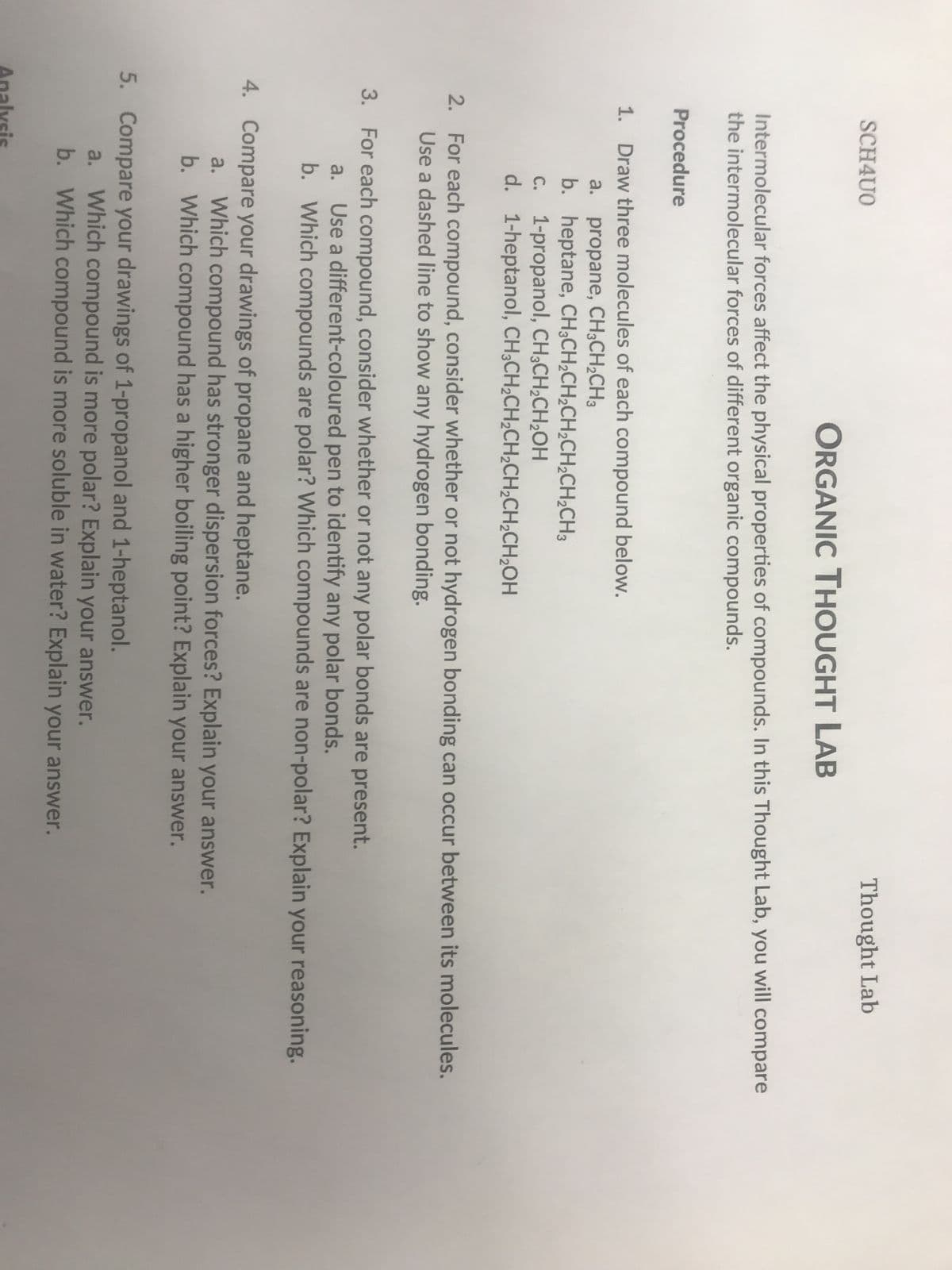SCH4U0 ORGANIC THOUGHT LAB Intermolecular forces affect the physical properties of compounds. In this Thought Lab, you will compare the intermolecular forces of different organic compounds. Procedure 1. Draw three molecules of each compound below. a. propane, CH3CH₂CH3 b. heptane, CH3CH₂CH₂CH₂CH₂CH₂CH3 c. 1-propanol, CH3CH₂CH₂OH d. 1-heptanol, CH3CH₂CH₂CH₂CH₂CH₂CH₂OH 2. For each compound, consider whether or not hydrogen bonding can occur between its molecules. Use a dashed line to show any hydrogen bonding. Thought Lab 3. For each compound, consider whether or not any polar bonds are present. a. Use a different-coloured pen to identify any polar bonds. b. Which compounds are polar? Which compounds are non-polar? Explain your reasoning. 4. Compare your drawings of propane and heptane. a. Which compound has stronger dispersion forces? Explain your answer. b. Which compound has a higher boiling point? Explain your answer. 5. Compare your drawings of 1-propanol and 1-heptanol. a. Which compound is more polar? Explain your answer. b. Which compound is more soluble in water? Explain your answer.
SCH4U0 ORGANIC THOUGHT LAB Intermolecular forces affect the physical properties of compounds. In this Thought Lab, you will compare the intermolecular forces of different organic compounds. Procedure 1. Draw three molecules of each compound below. a. propane, CH3CH₂CH3 b. heptane, CH3CH₂CH₂CH₂CH₂CH₂CH3 c. 1-propanol, CH3CH₂CH₂OH d. 1-heptanol, CH3CH₂CH₂CH₂CH₂CH₂CH₂OH 2. For each compound, consider whether or not hydrogen bonding can occur between its molecules. Use a dashed line to show any hydrogen bonding. Thought Lab 3. For each compound, consider whether or not any polar bonds are present. a. Use a different-coloured pen to identify any polar bonds. b. Which compounds are polar? Which compounds are non-polar? Explain your reasoning. 4. Compare your drawings of propane and heptane. a. Which compound has stronger dispersion forces? Explain your answer. b. Which compound has a higher boiling point? Explain your answer. 5. Compare your drawings of 1-propanol and 1-heptanol. a. Which compound is more polar? Explain your answer. b. Which compound is more soluble in water? Explain your answer.
Chemistry: The Molecular Science
5th Edition
ISBN:9781285199047
Author:John W. Moore, Conrad L. Stanitski
Publisher:John W. Moore, Conrad L. Stanitski
Chapter10: Fuels, Organic Chemicals, And Polymers
Section: Chapter Questions
Problem 107QRT
Related questions
Question
Please help me with this worksheet on

Transcribed Image Text:SCH4U0
ORGANIC THOUGHT LAB
Intermolecular forces affect the physical properties of compounds. In this Thought Lab, you will compare
the intermolecular forces of different organic compounds.
Procedure
1. Draw three molecules of each compound below.
a. propane, CH3CH₂CH3
b. heptane, CH3CH₂CH₂CH₂CH₂CH₂CH3
c. 1-propanol, CH3CH₂CH₂OH
d. 1-heptanol, CH3CH₂CH₂CH₂CH₂CH₂CH₂OH
2. For each compound, consider whether or not hydrogen bonding can occur between its molecules.
Use a dashed line to show any hydrogen bonding.
3. For each compound, consider whether or not any polar bonds are present.
a. Use a different-coloured pen to identify any polar bonds.
b. Which compounds are polar? Which compounds are non-polar? Explain your reasoning.
4. Compare your drawings of propane and heptane.
Thought Lab
Analysis
5. Compare your drawings of 1-propanol and 1-heptanol.
a. Which compound has stronger dispersion forces? Explain your answer.
b. Which compound has a higher boiling point? Explain your answer.
a. Which compound is more polar? Explain your answer.
b. Which compound is more soluble in water? Explain your answer.
Expert Solution
This question has been solved!
Explore an expertly crafted, step-by-step solution for a thorough understanding of key concepts.
This is a popular solution!
Trending now
This is a popular solution!
Step by step
Solved in 5 steps with 12 images

Knowledge Booster
Learn more about
Need a deep-dive on the concept behind this application? Look no further. Learn more about this topic, chemistry and related others by exploring similar questions and additional content below.Recommended textbooks for you

Chemistry: The Molecular Science
Chemistry
ISBN:
9781285199047
Author:
John W. Moore, Conrad L. Stanitski
Publisher:
Cengage Learning

Chemistry & Chemical Reactivity
Chemistry
ISBN:
9781133949640
Author:
John C. Kotz, Paul M. Treichel, John Townsend, David Treichel
Publisher:
Cengage Learning

Chemistry & Chemical Reactivity
Chemistry
ISBN:
9781337399074
Author:
John C. Kotz, Paul M. Treichel, John Townsend, David Treichel
Publisher:
Cengage Learning

Chemistry: The Molecular Science
Chemistry
ISBN:
9781285199047
Author:
John W. Moore, Conrad L. Stanitski
Publisher:
Cengage Learning

Chemistry & Chemical Reactivity
Chemistry
ISBN:
9781133949640
Author:
John C. Kotz, Paul M. Treichel, John Townsend, David Treichel
Publisher:
Cengage Learning

Chemistry & Chemical Reactivity
Chemistry
ISBN:
9781337399074
Author:
John C. Kotz, Paul M. Treichel, John Townsend, David Treichel
Publisher:
Cengage Learning

